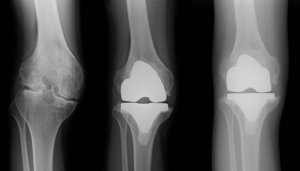 Have you ever been told by a doctor or health care provider that you have arthropathy? Let’s make a little sense of this medical term.
Have you ever been told by a doctor or health care provider that you have arthropathy? Let’s make a little sense of this medical term.
Arthropathy means any disease of the joints.
A joint is a place where two bones contact each other. The main form of joint disease is arthritis, which is joint inflammation. There are different forms of arthritis such as rheumatoid arthritis and osteoarthritis. Rheumatoid arthritis is another example of an immune disorder in which the body’s defense system attacks its own tissues, causing inflammation of bone joints. Osteoarthritis is a disease of the joints that is made worse by physical stress (e.g., aging and wear and tear).
Another form of arthropathy is crystal arthropathy, in which crystals are deposited in the joint, causing symptoms such as joint pain. In diabetic arthropathy, joint disease is caused by the effects of diabetes mellitus. In diabetes mellitus, the body is not able to effectively use a natural chemical called insulin, which quickly absorbs glucose (a type of sugar) from the blood into cells for their energy needs and into the fat and liver cells for storage. Enteropathic arthropathy is joint disease caused by colitis and related conditions. Colitis is a condition in which there is inflammation of the colon (part of the large intestine). In neuropathic arthropathy, joint disease is associated with a loss of sensation.
In reactive arthropathy, joint disease is caused by an infection in another part of the body. Lastly, spodylarthopathy is joint disease of the vertebral column (bones that surround the spine). the study of the structural and functional changes caused by joint disease is known as arthropathology. Arthropathy comes from the Greek word “arthron” meaning “joint,” and the Greek word “pathos” meaning “suffering.” Put the words together and you get “joint suffering.”
Simple, right?
Often times, radiology reports that involve imaging of the shoulder, knee, wrist and other joints or extremities may reference arthropathy. Hopefully, now you know a bit more about the terminology.

